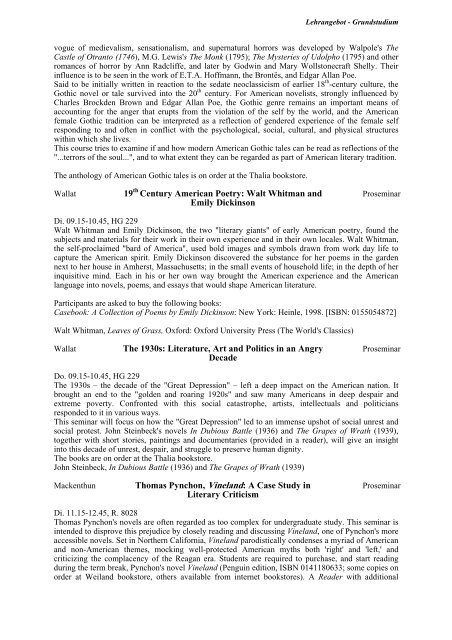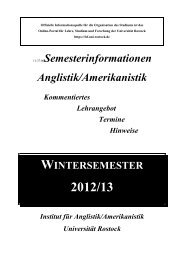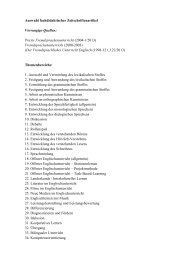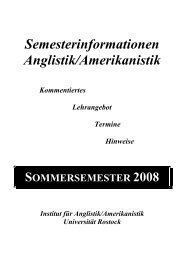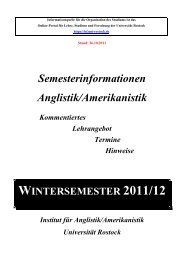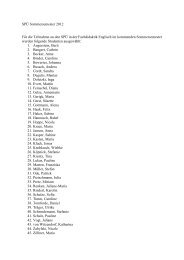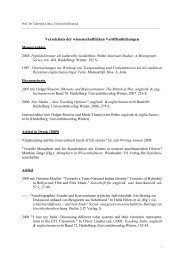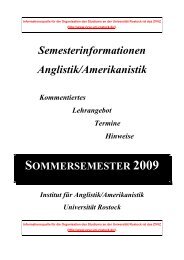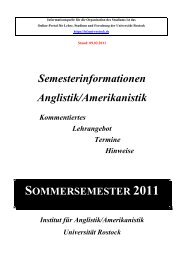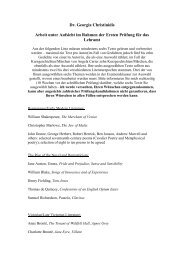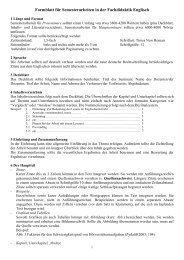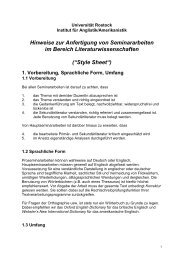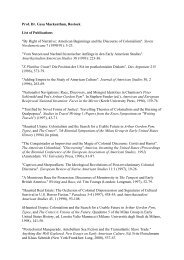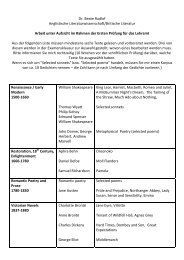SOMMERSEMESTER 2004 - Institut für Anglistik/Amerikanistik
SOMMERSEMESTER 2004 - Institut für Anglistik/Amerikanistik
SOMMERSEMESTER 2004 - Institut für Anglistik/Amerikanistik
Create successful ePaper yourself
Turn your PDF publications into a flip-book with our unique Google optimized e-Paper software.
Lehrangebot - Grundstudium<br />
vogue of medievalism, sensationalism, and supernatural horrors was developed by Walpole's The<br />
Castle of Otranto (1746), M.G. Lewis's The Monk (1795); The Mysteries of Udolpho (1795) and other<br />
romances of horror by Ann Radcliffe, and later by Godwin and Mary Wollstonecraft Shelly. Their<br />
influence is to be seen in the work of E.T.A. Hoffmann, the Brontës, and Edgar Allan Poe.<br />
Said to be initially written in reaction to the sedate neoclassicism of earlier 18 th -century culture, the<br />
Gothic novel or tale survived into the 20 th century. For American novelists, strongly influenced by<br />
Charles Brockden Brown and Edgar Allan Poe, the Gothic genre remains an important means of<br />
accounting for the anger that erupts from the violation of the self by the world, and the American<br />
female Gothic tradition can be interpreted as a reflection of gendered experience of the female self<br />
responding to and often in conflict with the psychological, social, cultural, and physical structures<br />
within which she lives.<br />
This course tries to examine if and how modern American Gothic tales can be read as reflections of the<br />
"...terrors of the soul...", and to what extent they can be regarded as part of American literary tradition.<br />
The anthology of American Gothic tales is on order at the Thalia bookstore.<br />
Wallat<br />
19 th Century American Poetry: Walt Whitman and<br />
Emily Dickinson<br />
Proseminar<br />
Di. 09.15-10.45, HG 229<br />
Walt Whitman and Emily Dickinson, the two "literary giants" of early American poetry, found the<br />
subjects and materials for their work in their own experience and in their own locales. Walt Whitman,<br />
the self-proclaimed "bard of America", used bold images and symbols drawn from work day life to<br />
capture the American spirit. Emily Dickinson discovered the substance for her poems in the garden<br />
next to her house in Amherst, Massachusetts; in the small events of household life; in the depth of her<br />
inquisitive mind. Each in his or her own way brought the American experience and the American<br />
language into novels, poems, and essays that would shape American literature.<br />
Participants are asked to buy the following books:<br />
Casebook: A Collection of Poems by Emily Dickinson: New York: Heinle, 1998. [ISBN: 0155054872]<br />
Walt Whitman, Leaves of Grass, Oxford: Oxford University Press (The World's Classics)<br />
Wallat<br />
The 1930s: Literature, Art and Politics in an Angry<br />
Decade<br />
Proseminar<br />
Do. 09.15-10.45, HG 229<br />
The 1930s – the decade of the "Great Depression" – left a deep impact on the American nation. It<br />
brought an end to the "golden and roaring 1920s" and saw many Americans in deep despair and<br />
extreme poverty. Confronted with this social catastrophe, artists, intellectuals and politicians<br />
responded to it in various ways.<br />
This seminar will focus on how the "Great Depression" led to an immense upshot of social unrest and<br />
social protest. John Steinbeck's novels In Dubious Battle (1936) and The Grapes of Wrath (1939),<br />
together with short stories, paintings and documentaries (provided in a reader), will give an insight<br />
into this decade of unrest, despair, and struggle to preserve human dignity.<br />
The books are on order at the Thalia bookstore.<br />
John Steinbeck, In Dubious Battle (1936) and The Grapes of Wrath (1939)<br />
Mackenthun<br />
Thomas Pynchon, Vineland: A Case Study in<br />
Literary Criticism<br />
Proseminar<br />
Di. 11.15-12.45, R. 8028<br />
Thomas Pynchon's novels are often regarded as too complex for undergraduate study. This seminar is<br />
intended to disprove this prejudice by closely reading and discussing Vineland, one of Pynchon's more<br />
accessible novels. Set in Northern California, Vineland parodistically condenses a myriad of American<br />
and non-American themes, mocking well-protected American myths both 'right' and 'left,' and<br />
criticizing the complacency of the Reagan era. Students are required to purchase, and start reading<br />
during the term break, Pynchon's novel Vineland (Penguin edition, ISBN 0141180633; some copies on<br />
order at Weiland bookstore, others available from internet bookstores). A Reader with additional


